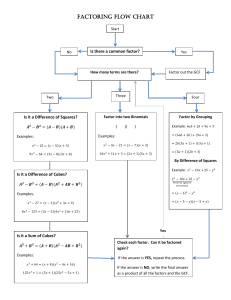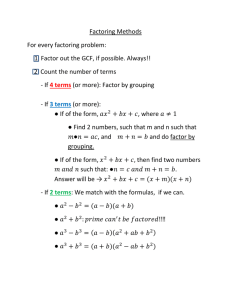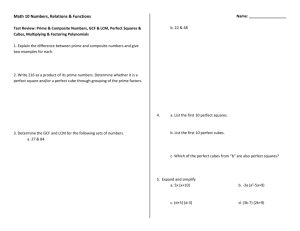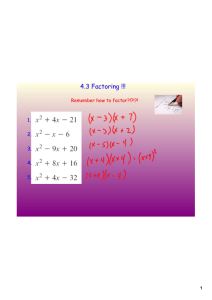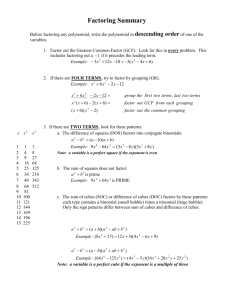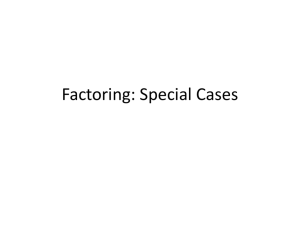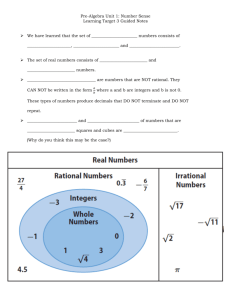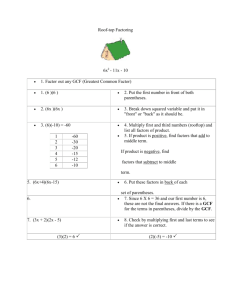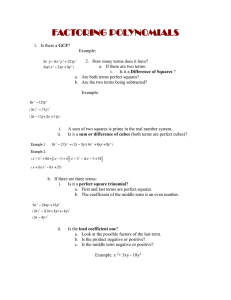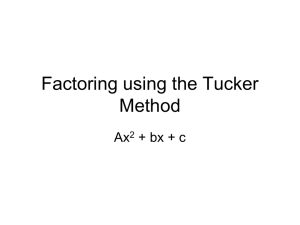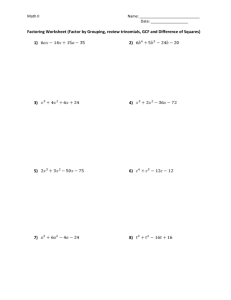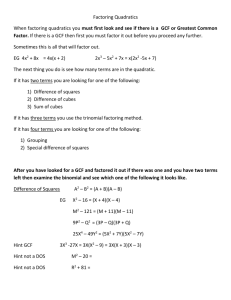Factoring Review Worksheet: Algebra Practice Problems
advertisement
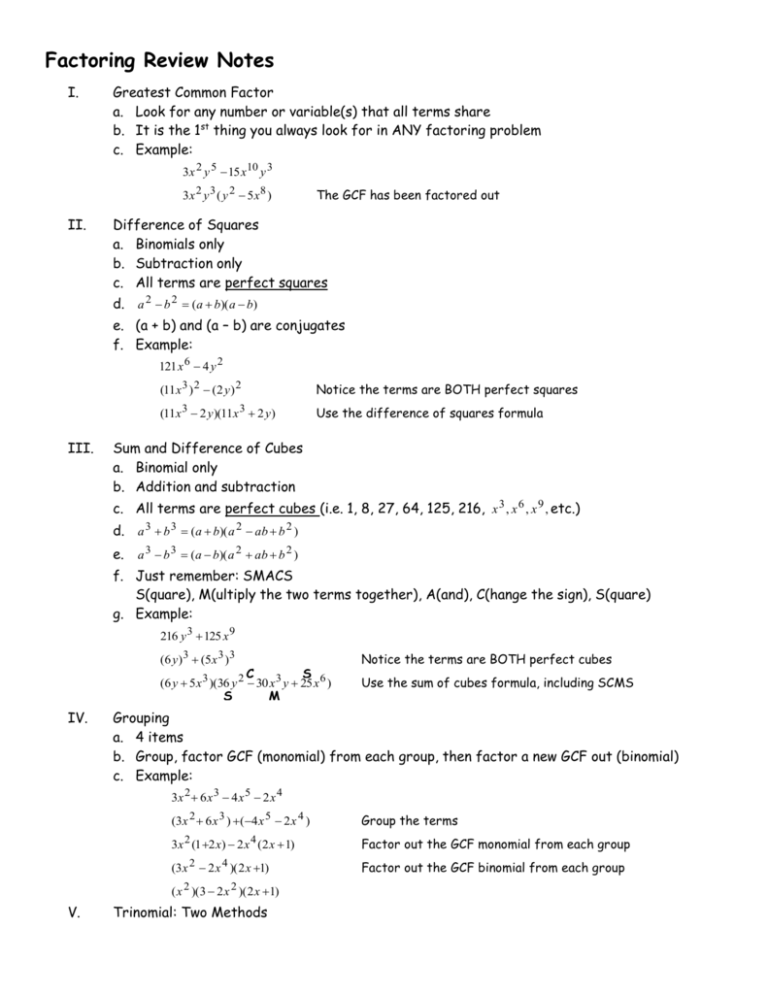
Factoring Review Notes I. Greatest Common Factor a. Look for any number or variable(s) that all terms share b. It is the 1st thing you always look for in ANY factoring problem c. Example: 3x 2 y 5 15 x10 y 3 3x 2 y 3 ( y 2 5 x8 ) II. The GCF has been factored out Difference of Squares a. Binomials only b. Subtraction only c. All terms are perfect squares d. a 2 b 2 (a b)( a b) e. (a + b) and (a – b) are conjugates f. Example: 121 x 6 4 y 2 III. (11 x 3 ) 2 ( 2 y ) 2 Notice the terms are BOTH perfect squares (11 x 3 2 y )(11 x 3 2 y ) Use the difference of squares formula Sum and Difference of Cubes a. Binomial only b. Addition and subtraction c. All terms are perfect cubes (i.e. 1, 8, 27, 64, 125, 216, x 3 , x 6 , x 9 , etc.) d. a 3 b 3 (a b)( a 2 ab b 2 ) e. a 3 b 3 (a b)( a 2 ab b 2 ) f. Just remember: SMACS S(quare), M(ultiply the two terms together), A(and), C(hange the sign), S(quare) g. Example: 216 y 3 125 x 9 (6 y ) 3 (5 x 3 ) 3 C S (6 y 5 x 3 )(36 y 2 30 x 3 y 25 x 6 ) S IV. M Notice the terms are BOTH perfect cubes Use the sum of cubes formula, including SCMS Grouping a. 4 items b. Group, factor GCF (monomial) from each group, then factor a new GCF out (binomial) c. Example: 3x 2 6 x 3 4 x 5 2 x 4 (3 x 2 6 x 3 ) (4 x 5 2 x 4 ) Group the terms 3x 2 (1 2 x) 2 x 4 (2 x 1) Factor out the GCF monomial from each group 2 4 (3 x 2 x )( 2 x 1) ( x 2 )(3 2 x 2 )( 2 x 1) V. Trinomial: Two Methods Factor out the GCF binomial from each group Error Method a. Make sure you have factored out the GCF if one exists b. Multiple the 1st term (a) and 3rd term (c) together: this is your “multiplication” goal c. The 2nd term (b) is your “addition” goal d. Find 2 numbers that multiply together to equal a times c and add together to equal b e. Create the “error” factors by taking the coefficient of the first term , the variable to the first power, and the two numbers f. Reduce the “error” factors to find your final answer g. Example: 3x 2 11x 6 Find two numbers that multiply to equal 18 and add to give you 11 (3x 2)(3x 9) Create the “error” factors (3x 2)( x 3) Reduce Split the middle/Box Method a. Multiple the 1st term (a) and 3rd term (c) together: this is your “multiplication” goal b. The 2nd term (b) is your “addition” goal c. Find 2 numbers that multiply together to equal a times c and add together to equal b; then split the middle term using the two numbers d. Finish using factor by grouping e. Example: 3x 2 11x 6 Find two numbers that multiply to equal 18 and add to give you 11 3x 2 2 x 9 x 6 Split 11x into 2x and 9x (since 2 and 9 are your numbers) (3 x 2 2 x) (9 x 6) Factor by grouping x(3x 2) 3(3x 2) ( x 3)(3x 2) OR…. Pre-Calculus Honors Factoring & Fractions Practice Worksheet The use of a calculator is prohibited. To receive full credit, all work must be done on notebook paper. Factor each problem below completely. A. Remove the greatest common factor. B. Difference of Two Squares 1. c2 m 2m 2. 3r a 2r 3. mx 2 my 2 4. 3x 2 3x 6 1. x 2 49 2. 9 x 2 1 3. 25y 2 x 2 4. 1 196n6 C. Greatest Common Factor/Difference of Squares D. Sum or Difference of Two Cubes 1. ra 2 rb 2 1. 8 y 3 1 2. 5y 2 45 2. a 3 8 3. 9r 2 z 16s2 z 3. x 6 y 6 27 3 8 3 4. y x 27 x 3 y 6 64 27 4. 2 x 4 18 y 2 E. Grouping F. Trinomials 1. k 2 2k kt 2t 1. x2 9x 10 2. x 2 x xy y 2. 9w2 12w 4 3. 3b2 2b 12b 8 3. 6 y 2 19 y 15 4. x 3 21 3x 2 7 x 4. x4 19x2 48 G. Mixed Types 1. 2. 3. 4. 2cx 2 7cx 3c 16x 3 2 10x 2 45x 50 9 x 2 16 y 2 5. 50c2 2d 2 6. 27 x 3 8 y 3 Perform the indicated operation. All answers in lowest terms. No mixed numbers!! 1. 2 4 3 7 1 6 2. 5 35 x 10 3 x 15 7. 3x 15 6 x 30 3. 10 36 3 15 7x y 8. 2 15 y 18 xy 4. 9. 12 24 25 100 x 2 2 2 x 4 3x 5 x 2 5. 7 8 5 3 6. 10. 1 1 x y 1 1 x 1 2 x 1 x 1
